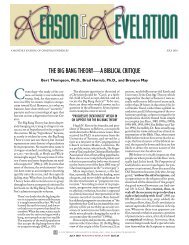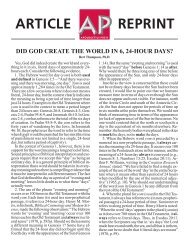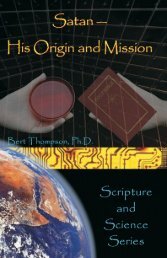The Many Faces, and Causes, of Unbelief - Apologetics Press
The Many Faces, and Causes, of Unbelief - Apologetics Press
The Many Faces, and Causes, of Unbelief - Apologetics Press
You also want an ePaper? Increase the reach of your titles
YUMPU automatically turns print PDFs into web optimized ePapers that Google loves.
from the only God ye seek not?,” He summed up one <strong>of</strong> the<br />
main reasons why many are unprepared to believe in God.<br />
Man is so busy seeking <strong>and</strong> reveling in his own glory that he<br />
has neither the time nor the inclination to <strong>of</strong>fer glory to His<br />
Maker. An unhealthy lust for power wrapped in a cloak <strong>of</strong><br />
pride breeds unbelief. German philosopher Friedrich Nietzsche<br />
(he <strong>of</strong> “God is dead” fame) expressed such an attitude<br />
when he asked a friend, “If there were gods, how could I endure<br />
it to be no god?” In his famous composition, Invictus,infidel<br />
poet William Ernest Henley wrote: “I am the master <strong>of</strong><br />
my fate; I am the captain <strong>of</strong> my soul.” <strong>The</strong> famed Harvard<br />
evolutionist, George Gaylord Simpson, ended one <strong>of</strong> his<br />
books with these words: “Man is his own master. He can <strong>and</strong><br />
must decide <strong>and</strong> manage his own destiny” (1953, p. 155).<br />
One <strong>of</strong> the most famous apologists among Christian theists<br />
<strong>of</strong> the past generation was the renowned biblical scholar<br />
Wilbur M. Smith. In 1945 he authored <strong>The</strong>refore St<strong>and</strong>, which<br />
was then, <strong>and</strong> is now, a classic in the field <strong>of</strong> Christian apologetics.<br />
In chapter three, under the heading <strong>of</strong> “Some Reasons<br />
for the <strong>Unbelief</strong> <strong>of</strong> Men <strong>and</strong> <strong>The</strong>ir Antagonism Against God,”<br />
Dr. Smith listed numerous causes <strong>of</strong> unbelief, one <strong>of</strong> which<br />
was “<strong>The</strong> Pride <strong>of</strong> Man.” Included in his discussion <strong>of</strong> that<br />
subject was this observation:<br />
When man says he believes in a Supreme Being...he<br />
at the same time, if he is honest, confesses that God is<br />
holy, <strong>and</strong> he himself, unholy, that God is independent<br />
<strong>and</strong> can do according to His own will, while man<br />
is dependent. All this is humiliating; it takes away<br />
any cause for pride, for if there is one thing that man<br />
has always liked to feel it is that he is sufficient for all<br />
things, that he is going to bring about a better world<br />
by his own ingenuity, that he is the greatest <strong>and</strong> highest<br />
<strong>and</strong> most important phenomenon in the world,<br />
<strong>and</strong> that beyond him there is nothing worth considering<br />
(1974 reprint, p. 151).<br />
In the text they co-authored, A Survey <strong>of</strong> European Civilization:<br />
1500-Present, historians Walter Ferguson <strong>and</strong> Ge<strong>of</strong>frey<br />
Bruun discussed the “intellectual revolution” that had engulfed<br />
-76

















